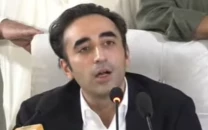Gone: 'The office of the prime minister stands vacant'
Gilani stands disqualified since April 26; President asked to ensure continuation of the democratic process.

A swift, short order sent the longest-serving prime minister packing home on Tuesday.
For five years.
For the first time in Pakistan’s history.
Notwithstanding the National Assembly speaker’s ruling, and a parliamentary resolution supporting it, the apex court disqualified elected prime minister Yousaf Raza Gilani. The disqualification, the court ordered, was effective from April 26 – which could potentially open up a whole new set of problems.
A three-judge bench headed by Chief Justice Iftikhar Muhammad Chaudhry and comprising Justice Jawwad S Khwaja and Justice Khilji Arif Hussain declared Gilani ineligible to be a member of parliament.
The four-page order on the fourth hearing of the case against the speaker’s ruling also issued instructions for the Election Commission of Pakistan and President Asif Ali Zardari.
“The Election Commission of Pakistan is required to issue notification of disqualification of Syed Yousaf Raza Gilani from being a member of the Majlis-e-Shoora w.e.f 26.4.2012,” the order stated.
“The president of Pakistan is required to take necessary steps under the Constitution to ensure continuation of the democratic process through [a] parliamentary system of government in the country,” the order added.
Earlier, the speaker had decided against forwarding the Supreme Court’s reference, in the contempt case against Gilani, to the Election Commission of Pakistan. The speaker had also refused to disqualify the former premier from his post.
Opposition parties, including the Pakistan Muslim League-Nawaz and the Pakistan Tehreek-e-Insaf, subsequently filed petitions, challenging the speaker’s ruling.
Tuesday’s apex court verdict stated that Gilani had been disqualified on April 26, when a verdict in the contempt case was announced by a seven-judge bench, and therefore has been ineligible to be the prime minister since then.
The verdict asked the election commission to issue a notification for disqualification of Gilani from being a member of parliament.
The judgment, authored and read out by the chief justice, said: “… Since no appeal was filed against this judgment, the conviction has attained finality… Gillani has become disqualified from being a member of the Majlis-e-Shoora (Parliament) on and from the date and time of pronouncement of the judgment of this Court dated 26.04.2012 with all consequences…”
A composed Aitzaz Ahsan, counsel for Gilani, left the court before the announcement of the final judgment. Attorney-General Irfan Qadir was not present in the court either at the time the judgment was announced. Following the verdict, all Cabinet ministers stopped using security protocol assigned to them, and national flags were removed from their vehicles.
Speaker’s powers
During the hearing, the court also took serious exception over the speaker’s conduct – sitting over a seven-member bench’s verdict. The chief justice said no one has the right to scrutinise the Supreme Court’s judgment – not the speaker, the election commission or any other forum – except the appellate bench of the apex court.
Justice Khwaja observed that, as in the process of appointment of judges, where President Zardari has no role except issuing notification, the speaker’s role was also symbolic in this case.
He said that there should have been the concept of mutual respect and the speaker should have referred this matter to the election commission, in honour of the Supreme Court’s verdict. The attorney general, however, had told the bench that a court decision against speaker’s ruling could be set aside by parliament. He also presented a resolution before the bench, which stated that the parliament had confidence in the speaker, Dr Fehmida Mirza’s, decision.
Being an attorney general, Qadir should assist the court proceedings rather than defending a party, the bench observed. The chief justice said the court respected parliament, and they should do their job while the court does its own.
(Read: A judicial coup?)
Published In The Express Tribune, June 20th, 2012.



















COMMENTS
Comments are moderated and generally will be posted if they are on-topic and not abusive.
For more information, please see our Comments FAQ